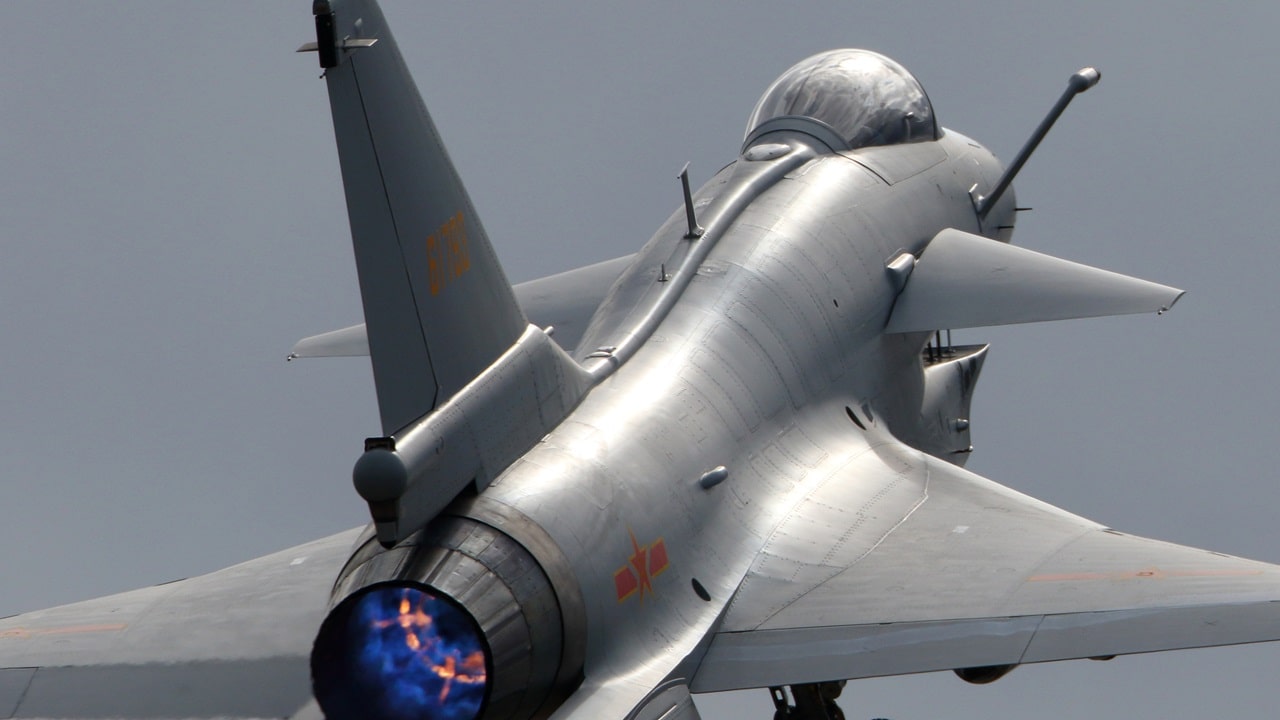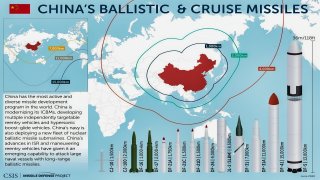China Has A Thousands of Missiles and Could Wipe Out U.S. Bases in a War
China has thousands of conventional missiles that could do a lot of damage to U.S. and allied bases if a war did ever occur for any reason. Also, of course, Beijing has nuclear weapons as well.
How could China actually regain control of Taiwan by force? The quick answer is that it would be a costly endeavor, to say the least, one that would likely see the loss of numerous warships, and possibly hundreds of thousands of troops. There is ample evidence that Taipei would fight to the literal death, and probably even launch missiles at targets on the mainland.
However, the bigger issue is that the United States – and possibly its regional allies – would quickly become involved in such a conflict, sparking a literal Third World War in the Indo-Pacific. Beijing likely knows that it couldn't hope to invade Taiwan, plus face a war with the United States, one that could see Japan, the Philippines, South Korea, Australia, and possibly India dragged into the fight.
The longer answer could come down to removing the United States from the equation first.
Beijing wouldn't literally need to attack the continental United States but rather could strike bases in South Korea, Japan, and Guam. Such an attack would be similar to the strategy that Japan took during World War II when it sought to isolate the United States. The difference is that China has missiles that could make it nearly difficult – if not impossible – for the U.S. Navy or any branch of America's armed forces to respond.
China has thousands of conventional missiles that could do a lot of damage to U.S. and allied bases if a war did ever occur for any reason. Also, of course, Beijing has nuclear weapons as well.
China is a True Near-Peer Adversary
The 2023 China Military Power Report that the Pentagon delivered to Congress last month, reaffirmed the National Defense Strategy's premise that China is the only competitor with the intent, will, and capability to reshape the international order.
Communist leaders seek "the great rejuvenation of the Chinese nation," by 2049 – the 100th anniversary of the Chinese Communist Party's takeover of the world's largest country, the DoD report noted.
The report further estimated the Chinese now have more than 500 operational nuclear warheads as of May 2023. That is on track to exceed some of the Pentagon's previous predictions, while the report also warned that China is developing new intercontinental ballistic missiles. These may also be conventionally-armed missiles that if developed and fielded, could allow the PRC to threaten conventional strikes against targets in the continental United States, Hawaii, and Alaska.

The report also comes after a story in The Wall Street Journal from early February warned that the U.S. Strategic Command (STRATCOM) had informed Congress that China now has more launchers for Intercontinental Ballistic Missiles (ICBMs) than the United States.
A Chinese First Strike?
Such concerns of a Chinese attack are not entirely new – nor are they entirely unfounded. As Breaking Defense reported in June 2017, two U.S. Navy officials had called for a stronger defense of U.S. military facilities in Japan, north of Okinawa.
This could include the deployment of the U.S. Army's Terminal High Altitude Area Defense (THAAD), a highly effective, combat-proven defense against short, medium, and intermediate-range ballistic missile threats; and the U.S. Navy's Aegis.
Such a defense would reduce the temptation for Beijing to strike first in a crisis.
But would China actually take such a course of action? History serves as a lesson.
"This scenario isn’t implausible," Sydney J. Freedberg Jr. wrote for Breaking Defense. "Chinese history and doctrine since 1949 show a marked preference for surprise attack. They struck Korea in 1950, India in 1962, Vietnam in 1974 and '79. The Chinese usually justify their attacks as a defensive response to actions that threaten their sovereignty or vital interests. But those vital interests are defined very broadly — e.g. Beijing's claim to the entire South China Sea — and armed force is seen as a legitimate response to purely political, non-violent provocations."
China Downplays Military Build-Up
Even as Beijing has made it clear that its goal is to field a world-class military by 2040, China has downplayed its current military build-up.
Mao Ning, foreign ministry spokesperson, suggested that the U.S. report "is full of prejudice and spreads the theory of the threat posed by China." At the same time, she added that Beijing has "always maintained our nuclear forces at the lowest level required for national security, and we have no intention of engaging in a nuclear arms race with any country."
The U.S. Bases – Do They Threaten China?
The socialist news outlet Solidarity suggested that it is the United States, not China that could be seen as an aggressor, and that Beijing's missile build-up is meant to confront the largest bully in the Indo-Pacific – namely the United States.
"In 1951 US military planners developed the 'first island chain' security theory in an effort to preserve US control of the Pacific—right up to the Chinese coastline," the outlet noted. "This was a response to the development of the Cold War in Asia. In October 1949 the US-backed Guomindang lost the civil war in China to the Chinese Communist Party and fled to Taiwan. Then the US fought a bloody war in Korea against North Korean and Chinese troops backed by Russia."
It further argued, "China is effectively encircled by US bases all across the Pacific—threatening a catastrophic war between the world’s two greatest powers."
However that argument doesn't take into consideration that China maintains Taiwan is a breakaway province despite the fact that the Chinese Communist Party (CCP) never had control of the self-ruling island, or that China's 10-dash map lays claim to the territorial waters of its neighbors.
Author Experience and Expertise
Peter Suciu is a Michigan-based writer. He has contributed to more than four dozen magazines, newspapers, and websites with over 3,200 published pieces over a twenty-year career in journalism. He regularly writes about military hardware, firearms history, cybersecurity, politics, and international affairs. Peter is also a Contributing Writer for Forbes and Clearance Jobs. You can follow him on Twitter: @PeterSuciu.
Hero image is courtesy of CSIS.
In-text image is Creative Commons.


